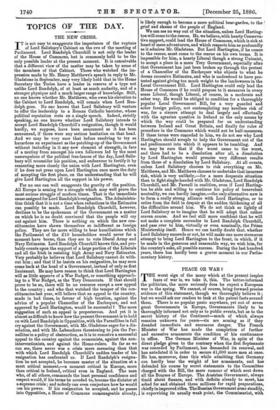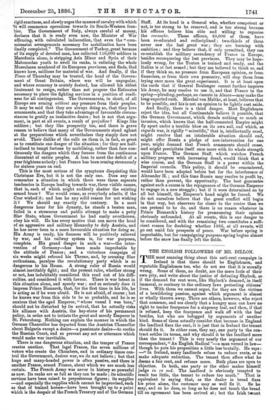PEACE OR WAR?
THE worst sign of the many which at the present inspire fears of war is, we take it, this. The better-informed the politician, the more seriously does he expect a European war in the spring. We cannot, of course, bring forward precise evidence of this statement, though we thoroughly believe it ; but we would ask our readers to look at the patent facts around them. There is no popular panic anywhere, yet out of seven great Governments in Europe, Governments likely to be thoroughly informed not only as to public events, but as to the secret history of the Continent—much of which always remains unknown for years—six are arming as if they dreaded immediate and enormous danger. The French Minister of War has made the completion of further and excessive armaments the condition of his continuance in office. The German Minister of War, in spite of the direct pledge given to the contrary when the first Septennate was conceded by Parliament, has demanded its renewal, and has antedated it in order to secure 41,000 more men at once. He has, moreover, done this while admitting that Germany can hardly bear the weight of her armaments, and has defended his course by secret statements to the Committee charged with the Bill, the mere rumour of which sent down all the Bourses of Europe. The Austrian Government, always timid about finance, and with deficits already to meet, has asked for and obtained three millions for rapid preparations, chiefly in improved rifles. The Russian Government arms steadily, is supervising its usually weak point, the Commissariat, with
rigid exactness, and slowly urges the masses of cavalry with which it will commence operations towards its South-Western fron- tier. The Government of Italy, always careful of money, declares that it is ready even now, the Minister of War affirming, with calculated indiscretion, that even the "com- missariat arrangements necessary for mobilisation have been finally completed." The Government of Turkey, great because of its supply of devoted men, has collected 150,000 soldiers in Macedonia alone, is stripping Asia Minor and Syria of their Mahomedan youth to swell its ranks, is enlisting the whole Mussulman manhood of its European provinces, and finds, God knows how, millions for material of war. And finally, if the Times of Thursday may be trusted, the head of the Govern- ment of Great Britain, where war will be unpopular, and where economy is acutely desired, has allowed his ablest lieutenant to resign, rather than not propose the Estimates necessary to place the fighting services in a position of readi- ness for all contingencies. The Governments, in short, of all Europe are arming without any pressure from their peoples. It may be said that they are always doing so, that they love armaments, and that they take advantage of favourable circum- stances to gratify an instinctive desire ; but is not that argu- ment, in part at all events, a result of prejudice ? Kings like soldiers ; but they like prosperity too, and there is grave reason to believe that many of the Governments stand aghast at the preparations which nevertheless they simply dare not avoid. Their dislike of the calls on them is, in fact, so great as to constitute one danger of the situation ; for they are half- inclined to tempt fortune by mobilising, rather than face con- tinuously the dangers which they foresee from the continuous discontent of entire peoples. A loan to meet the deficit of a year frightens nobody ; but France has been arming strenuously for sixteen years on end.
This is the most serious of the symptoms disquieting this Christmas Eve, but it is not the only one. Does any one remember a situation in which there were three separate tendencies in Europe leading towards war, three visible causes, that is, each of which might suddenly shatter the existing armed truce ? War would come, as everybody admits, if the Czar wished it; and has he any solid reason for not wishing it ? We should say exactly the contrary. In a most dangerous hour for his dynasty, he stands a beaten man, foiled in a strenuous and public attempt to make a petty Slav State, whose Government he had easily overthrown, obey his will. He has every motive that can move the head of an aggressive and military Monarchy to defy Austria, and he has never been in a more favourable situation for doing so. His Army is ready, his finances will be positively relieved by war, and his railway system is, for war purposes, complete. His grand danger in such a war—the inter- vention of Germany—has been made improbable by the attitude of France ; and a victorious campaign of six weeks might refound his Throne, and, by arousing Slav enthusiasm, paralyse the revolutionary party which is so dangerous to his House. A strong ruler of Russia would almost inevitably fight ; and the present ruler, whether strong or not, has indubitably considered this road out of his diffi- culties, and considered it with favour. There is war latent in this situation alone, and speedy war ; and so seriously does it impress Prince Bismarck, that, for the first time in his life, he is acting as if he were afraid. He is not afraid, of course ; but he knows war from this side to be so probable, and he is so anxious that the aged Emperor, "whose vassal I was born," should not be disturbed by its arrival, that he actually risks his alliance with Austria, the key-stone of his permanent policy, in order not to irritate the great and moody Emperor in St. Petersburg. Nothing can explain the manner in which the German Chancellor has departed from the Austrian Chancellor about Bulgaria except a desire—a passionate desire—to soothe the Russian Court, and so prevent any act or utterance which would make war inevitable.
There is one dangerous situation, and the temper of France creates another. That legal France, the seven millions of voters who create the Chambers, and in ordinary times con- trol the Government, desires war, we do not believe ; but that huge and many-headed power is often passive, and there is another France, armed France, about which we are much less certain. The French Army was never in history so powerful as now. Its ranks are as full as they can be made ; its scientific services have been raised to preposterous figures ; its supplies —and especially the supplies which cannot be improvised, such as that of trained horses—have been brought up to a point which is the despair of the French Treasury and of the German Staff. At its head is a General who, whether competent or not, is too strong to be removed, and is too strong because his officers believe him able and willing to organise the revanche. Those officers, 40,000 of them, have been re-educated and redisciplined ; two-thirds of them never saw the last great war ; they are burning with ambition ; and they believe that, if only permitted, they can re-establish the military ascendency of France in Europe, besides reconquering the lost provinces. They may be hope- lessly wrong, for the Teuton is trained and ready, and the Italian is at last armed ; but they are believed to think so, and if they think so, no pressure from European opinion, or from financiers, or from their own peasantry, will stop them from trying once more the great experiment. It is at least upon the cards that if General Boulanger cannot further improve his Army, he may resolve to use it, and that France in the spring—pleading, perhaps, an 6nreute in Alsace—may make the long-expected rush. Marshal von Moltke, at least, believes that to be possible, and his is not an opinion to be lightly cast aside. And finally, there is a third danger. Most Englishmen reject the idea, but all Continentals believe it possible, that the German Government, which dreads nothing so much as invasion, which knows that the half-cemented Empire might fly apart under a terrible blow on its own soil, and which, aa regards war, is rigidly "scientific," that is, intellectually cruel, might resolve that an intolerable situation should end, might offer Russia a pledge of non-intervention for one year, might demand that French armaments should cease, and might precipitate itself once more with its whole strength upon France. The German Staff, which watches French military progress with increasing dread, would think that a wise course, and the German Staff is a power within the Imperial councils. This policy, it should be remembered, would have been adopted before but for the interference of Alexander IL ; and this time Russia may resolve to profit by, rather than prevent, the opportunity. The best guarantee against such a course is the repugnance of the German Emperor to engage in a new struggle ; but if it were determined on by all but himself, the Emperor's hand might be forced. We do not ourselves believe that the great conflict will begin in that way, but observers far closer to the centre than we can pretend to be do, and there is no reason whatever in Prince Bismarck's history for pronouncing their opinion obviously unfounded. At all events, this is one danger to be considered, and with the remaining two constitutes a suffi- cient reason for doubting whether 188G, at all events, will go out amid fair prospects of peace. War before spring is improbable, but for campaigning purposes spring begins almost before the snow has finally left the fields.



































 Previous page
Previous page